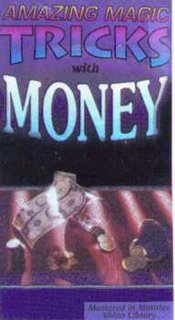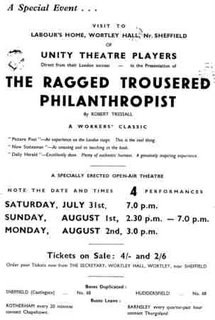| Thursday, November 03, 2005 |
| MONEY IS THE CAUSE OF POVERTY |
 THE MONEY TRICK THE MONEY TRICK
If all the money in the world was divided out equally, it wouldn't do any good! In six months' time it would be all back in the same hands again.'
`Of course,' said everybody.
`But he was saying the other day about money being no good at all!' observed Easton. `Don't you remember he said money was the principal cause of poverty?'
`So it is the principal cause of poverty,' said Owen, who entered at that moment.
`Hooray!' shouted Philpot, `The Professor has arrived and will now proceed to say a few remarks.'
As Owen, sat down in his usual place, Philpot rose solemnly to his feet, and, looking round the company, said: `Gentlemen, with your kind permission, as soon as the Professor has finished dinner he will deliver his well-known lecture, entitled,"Money the Principal Cause of being hard up", proving money isn't any good to anybody. Philpot resumed his seat amid cheers.
`Come on' cried Philpot, putting his hand on Owen's shoulder.`Prove that money is the cause of poverty.'
`It's one thing to say it and another to prove it,' sneered Crass.
`Money IS the real cause of poverty,' said Owen. `Money is the cause of poverty because it is the device by which those who are too lazy to work are enabled to rob the workers of the fruits of their labours.'
`Prove it,' said Crass.
`All right,' he replied. `I'll show you how the Great Money Trick is worked.'
Owen opened his dinner basket and took from it several slices of bread and placed them in a heap on a clean piece of paper, and, having borrowed the pocket knives they used to cut and eat their dinners with from Easton, Harlow and Philpot, he addressed them as follows:
`These pieces of bread represent the raw materials which exist naturally in and on the earth for the use of mankind; they were not made by any human being, but were created for the benefit and sustenance of all, the same as were the air and the light of the sun.
`Now,' continued Owen, `I am a capitalist; or, rather, I represent the landlord and capitalist class. That is to say, all these raw materials belong to me. It does not matter for our present argument how I obtained possession of them, or whether I have any real right to them; the only thing that matters now is the admitted fact that all the raw materials which are necessary for the production of the necessaries of life are now the property of the Landlord andCapitalist class. I am that class: all these raw materials belong to me.'
`Good enough!' agreed Philpot.
`Now you three represent the Working class: you have nothing - and for my part, although I have all these raw materials, they are of no use to me - what I need is the things that can be made out of these raw materials by Work: but as I am too lazy to work myself, I have invented the Money Trick to make you work FOR me. But first I must explain that I possess something else beside the raw materials. These three knives represent - all the machinery of production; the factories, tools, railways, and so forth, without which the necessaries of life cannot be produced in abundance. And these three coins' - taking three from his pocket - `represent my Money Capital.'
`But before we go any further,' said Owen, interrupting himself, `it is most important that you remember that I am not supposed to bemerely "a" capitalist. I represent the whole Capitalist Class. Youare not supposed to be just three workers - you represent the whole Working Class.'
`All right, all right,' said Crass, impatiently.
Owen proceeded to cut up one of the slices of bread into a number of little square blocks. `These represent the things which are produced by labour, aided by machinery, from the raw materials. We will suppose that three of these blocks represent - a week's work. We will suppose that a week's work is worth - one pound: and we will suppose that each of these coins is a £1.
`Now this is the way the trick works -' Owen now addressed himself to the working classes as represented byPhilpot, Harlow and Easton.
`You say that you are all in need of employment, and as I am the kind-hearted capitalist class I am going to invest all my money in various industries, so as to give you Plenty of Work. I shall pay each of you one pound per week, and a week's work is - you must each produce three of these square blocks. For doing this work you will each receive your wages; the money will be your own, to do as you like with, and the things you produce will of course be mine, to do as I like with. You will each take one of these machines and as soon as you have done a week's work, you shall have your money.'
The Working Classes accordingly set to work, and the Capitalist class sat down and watched them. As soon as they had finished, they passed the nine little blocks to Owen, who placed them on a piece of paper by his side and paid the workers their wages.
`These blocks represent the necessaries of life. You can't live without some of these things, but as they belong to me, you will haveto buy them from me: my price for these blocks is - one pound each.'
As the working classes were in need of the necessaries of life and as they could not eat, drink or wear the useless money, they were compelled to agree to the kind Capitalist's terms. They each bought back and at once consumed one-third of the produce of their labour.The capitalist class also devoured two of the square blocks, and so the net result of the week's work was that the kind capitalist had consumed two pounds worth of the things produced by the labour of the others, and reckoning the squares at their market value of one pound each, he had more than doubled his capital, for he still possessed the three pounds in money and in addition four pounds worth of goods. As for the working classes, Philpot, Harlow and Easton, having each consumed the pound's worth of necessaries they had bought with their wages, they were again in precisely the same condition as when they started work - they had nothing.
This process was repeated several times: for each week's work the producers were paid their wages. They kept on working and spending all their earnings. The kind-hearted capitalist consumed twice as much as any one of them and his pile of wealth continually increased. In a little while - reckoning the little squares at their market value of one pound each - he was worth about one hundred pounds, and the working classes were still in the same condition as when they began, and were still tearing into their work as if their lives depended upon it.
After a while the rest of the crowd began to laugh, and their merriment increased when the kind-hearted capitalist, just after having sold a pound's worth of necessaries to each of his workers,suddenly took their tools - the Machinery of Production - the knives away from them, and informed them that as owing to Over Production all his store-houses were glutted with the necessaries of life, he had decided to close down the works.
`Well, what are we to do now?.'
'That's not my business,' replied the kind-hearted capitalist. `I've paid you your wages, and provided you with Plenty of Work for a longtime past. I have no more work for you to do at present. Come round again in a few months' time and I'll see what I can do for you.' `But what about the necessaries of life?' demanded Harlow. `We must have something to eat.' `Of course you must,' replied the capitalist, affably; `and I shall be very pleased to sell you some.' `But we haven't got any money!'
`Well, you can't expect me to give you my goods for nothing! You didn't work for me for nothing, you know. I paid you for your work and you should have saved something: you should have been thrifty like me. Look how I have got on by being thrifty!'
The unemployed looked blankly at each other, but the rest of the crowd only laughed; and then the three unemployed began to abuse the kind-hearted Capitalist, demanding that he should give them some of the necessaries of life that he had piled up in his warehouses, or to be allowed to work and produce some more for their own needs; and even threatened to take some of the things by force if he did not comply with their demands. But the kind-hearted Capitalist told them not to be insolent, and spoke to them about honesty, and said if they were not careful he would have their faces battered in for them by the police, or if necessary he would call out the military and have them shot down like dogs, the same as he had done before at Featherstone and Belfast.
`Of course,' continued the kind-hearted capitalist, `if it were not for foreign competition I should be able to sell these things that you have made, and then I should be able to give you Plenty of Work again:but until I have sold them to somebody or other, or until I have used them myself, you will have to remain idle.' 
`Well, this takes the bloody biscuit, don't it?' said Harlow.
ABRIDGED AND ADAPTED FROM 'THE RAGGED TROUSERED PHILANTHROPISTS' By Robert Tressel (1911). |
posted by michael the tubthumper @ 3:45 pm  |
|
| 8 Comments: |
-
have to put one caveat in first... i don't think it was 'created' but i didn't want to change the thing too much.
-
Hi Michael, nice place you got here. This is what the second part of your post reminded me of, some more things to look out for
http://www.dabney.com/wacomuseum/library/martin1.html
-
Shaw said: "Lack of money is the root of all evil."
-
It's a long one, maybe that's why so few comments came your way. It's also a little archaic in its locutions, which I like but many don't.
Still and all, you're spot-on to post this now!
-
I loved this post, thanks for introducing me to this play (?), I will definitely look into it further.
Any story with someone named Philpot is a story for me!
-
i am glad to see your blog. thanks for sharing this valuable resources. keep it up. you can also earn money from here
http://hutmoney.blogspot.com
-
Makes a lot of sense. This is a different angle on the issue of poverty.
-
Grateful for sharing this post
|
| |
| << Home |
| |
|
|


have to put one caveat in first... i don't think it was 'created' but i didn't want to change the thing too much.